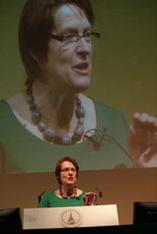
DEFRA secretary of state Caroline Spelman has promised to reduce red tape in UK agriculture in an effort to encourage young farmers, aid environmental sustainability and ensure future profitability.
In response to the European Commission’s plans for a reform of the Common Agricultural Policy (CAP), the Tory cabinet minister rallied the industry to become more positive, ambitious and confident, while insisting that the days of a government “unsympathetic” towards agriculture were long gone, at the 2011 Oxford Farming Conference (OFC) on Wednesday.
Spelman told a large audience of agricultural and horticultural representatives that both industry and government have to work together to “get the best deal for farmers, taxpayers, consumers and the environment”, as well as to make the CAP reform “fundamentally different”.
“[CAP] must be repositioned so that we can tackle the new challenges of achieving global food security and tackling and adapting to a changing climate,” she said. “Although [the Commission] set out the challenges for the sector, they did little to create a dynamic strategy that would usefully contribute to president Barroso’s 2020 vision. So, while I welcome their proposals for further moves towards market orientation and international competitiveness, I believe we can be more ambitious.
“We can be more positive; more confident. Now is the time to make very significant progress towards reducing our reliance on direct payments - it’s certainly something the farmers I know want to see happen. Rising global demand for food and rising food prices make it possible to reduce subsidies and plan for their abolition.”
But Liberal Democrat MEP George Lyon, also speaking at the conference - which traditionally sets the farming agenda for the year - argued that the worrying parts of the CAP reform plans were in the “silences”. He said: “What the plan stays silent on is how it will be divided and the scale of redistribution, but most worrying of all is the lack of clear vision in the CAP reform. There are big arguments to be had: it is liberalisation against re-regulation. We have done re-regulation and it doesn’t work - liberalisation is the correct way forward.
“Our industry has reached a watershed... A new agricultural model for the 21st century [is needed]. Sustainability is at the heart of the CAP reform and farmers need to be seen not as the problem but part of the solution.”
Spelman also called for farmers to live up to a better image through biodiversity and said that agriculture can be part of prime minister David Cameron’s vision that Britain will become “one of the international success stories of the new decade”.
The secretary of state said that young farmers should be encouraged to take up the challenge and meet long-term targets. “We want farming to enjoy a better image. We want more young people to enter the industry. We need to convince them that it offers good prospects… A clear priority for this government, and one that must underpin the commission’s approach, will be to reduce unnecessary red tape for farmers.
“We want to be in the vanguard in Europe in pursuing this further. Our aim is to develop an industry fit for an exciting future. A future that is innovative, competitive and profitable. We will not achieve that by burdening farmers or governments with more regulations.”



